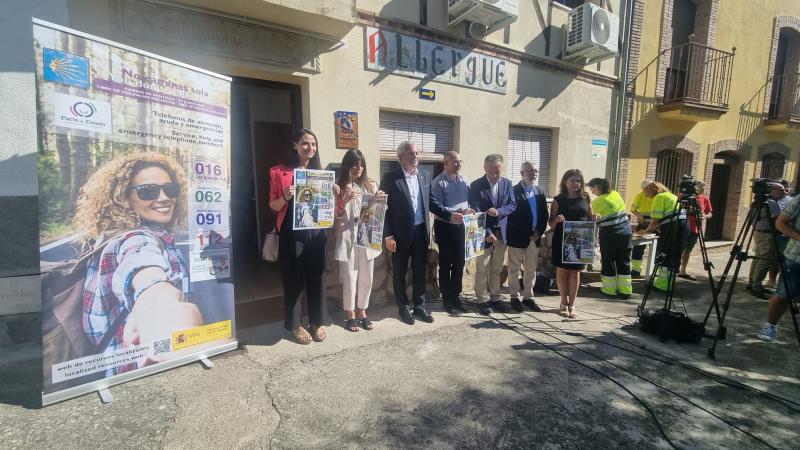Extremadura and Castilla y León join forces to present the campaign “Do not walk alone” to reinforce the safety of pilgrims

Extremadura and Castilla y León join forces to present the campaign “Do not walk alone” to reinforce the safety of pilgrims
The Government Delegations in Extremadura and Castilla y León presented today in the municipalities of Aldeanueva del Camino and La Calzada de Béjar the campaign “You are not walking alone: Camino de Santiago Free of Male Violence”. This is an initiative to strengthen the security of women who undertake this Jacobean route alone, promoted by the Coordination Units against Violence against Women of the Government Delegations in Aragón, Navarra, La Rioja, Castilla y León, Galicia and Extremadura.
The campaign was jointly presented by the government delegate in Extremadura, José Luis Quintana, and the government delegate in Castilla y León, Nicanor Sen. The event was accompanied by the subdelegates of Cáceres and Salamanca, representatives of the gender violence units of both communities, as well as the mayor of Aldeanueva del Camino, Ricardo García.
This year, the municipalities of Aldeanueva del Camino and La Calzada de Béjar, beginning and end of stage 16 of the Camino de Santiago through the Silver Route, have been chosen for the presentation of the campaign. In her speech, Quintana highlighted the importance of collaboration between government delegations to work together on initiatives that pursue common goals. “This is a task for all of us. That is why this year we wanted to do it together with the Delegation of the Government of Castilla y León, so that pilgrims can know, along the Jacobean route, all the resources available against gender violence, and also know that they have the help of the State Security Forces in case of a situation of this type.”
For his part, Nicanor Sen stressed that “to value this campaign is to value the equality for which the Government of Spain works”. Sen has defended the need to carry out this type of acts that “demonstrate to society that collaboration between different administrations is necessary and an example of how to face the fight against violence against women”. The government delegate in Castilla y León has thanked Quintana for the willingness and joint work to make the event around the campaign "Do not walk alone" a reality.
The campaign includes the dissemination, in different locations, of bilingual information cards and posters that include a QR code that links to the phones of the specialized resources in dealing with cases of violence against women. This material has been distributed through the 45 municipalities through which three pilgrimage routes pass in Extremadura. To the Silver and Mozarabic Route of the Camino de Santiago, the Government Delegation in Extremadura adds the Eulalian Route.
In Extremadura, the Civil Guard and the National Police have carried out the distribution of informative material by the hostels, accommodation, gas stations, pharmacies and public establishments located in these pilgrim sections in Extremadura territory.
Quintana has highlighted the importance of this initiative given that around 53% of the people who make the Camino de Santiago are women who every day choose more to do the solo tour and the program ‘No caminas sola’ seeks to reinforce their security during the pilgrimage to Compostela.
The campaign consists of posters and cards informing the telephone of attention to all forms of violence against women: (016), Emergencies (112), State Security Forces and Bodies, both Civil Guard (062) and National Police (091), information of the mobile application Alertcops and the QR code with access to the web of resources. These are 5,000 cards and 2,000 posters that have been distributed through these three pilgrim routes in Extremadura.
The government delegate has also highlighted that the pilgrims also have the mobile application AlertCops, joint for the Civil Guard and National Police. Among the functions of this tool is ‘Guardian of the Camino de Santiago’, which allows sharing the position with the State Security Forces and Bodies so that in case of emergency or risk the police posts can attend to the user more effectively.